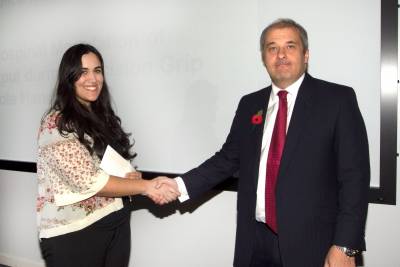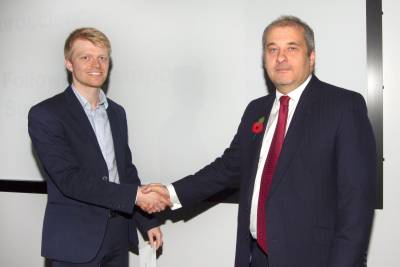2022
A review of the year by Professor Michael Hanna, Director of UCL Queen Square Institute of Neurology, followed by the Annual Address by Dame Anne M. Johnson, Professor of Infectious Disease Epidemiology, and President of the Academy of Medical Sciences.
Review of the year
Professor Michael Hanna began by thanking everyone for all their work over the past two years, including impactful COVID-19 research - 25 PIs have been involved in 145 papers, from early highly cited papers in March 2020 to apps to support patients in the stroke service.
Professor Hanna highlighted achievements over the past year, including successful £90m renewal of UCLH BRC, and the Dementia theme and Translational Neuroscience themes which are based at ION, Leonard Wolfson Experimental Neurology Centre's successful £10m NIHR CRF bid for 2022-27, and UK DRI's Quinquennial Review.
Professor Hanna thanked the ION leadership and Professional Services team for their contributions over the past year, and acknowledged support from the Faculty and Divisions, and all our external partnerships. He paid specific thanks to staff who had left ION in 2022, including Libby Bertram and Paul Whiting.
He also highlighted ION's impressive research output: increased peer review publications, as well as success in the REF2021, and the highest number of active grants including 9 grants of over £1m and 14 over £500k, and £15m income from Enterprise activities.
Professor Hanna showcased wide-ranging examples of ION's research impact, including novel therapeutic targets for ALS, MRI guided focused ultrasound, an intensive comprehensive aphasia programme, brain charts over the lifespan, the new UK DRI fluid biomarker platform, multi-stage multi-arm MS trials, gene therapy for brain circuit disorders, the Huntington's Disease REF impact case study, and primary human mitochondrial disease research.
ION's Science Away Day had reviewed ION's strategic plan with its emphasis on actively translating knowledge, and Professor Hanna highlighted our Translation and Enterprise activities, supported by the new Translational Research manager, and the Symposium which took place before this Annual Address. He also emphasised ION's gene therapy research, including plans for a new gene therapy accelerator centre.
Professor Hanna also gave an update on the creation of the world-class centre of excellence in neuroscience on Grays Inn Road, including the burial of a time capsule in May 2022.
These achievements were complemented by many individual ION researchers' awards and appointments, including a knighthood for Professor Sir John Hardy, and new Fellows of the Academy of Medical Sciences and the British Academy, alongside success in 2022 senior and early career promotions, and a Wellcome Career Development Award.
Professor Hanna also highlighted ION-wide EDI initiatives, with 12% of ION staff involved in EDI activities, as well as Educational achievements and scholarships, and ION's sustainability initiatives, including Professor Sanjay Sisodiya's work on Climate Change and Epilepsy. He closed by awarding the Queen Square Essay Prize to Kanza Tariq, and introducing Dame Anne M. Johnson's Annual Address.
Annual Address
We were delighted to welcome as the guest speaker Dame Anne M. Johnson MD, FMedSci, FFPH, FRCP, FRCGP, Professor of Infectious Disease Epidemiology & President of the Academy of Medical Sciences ‘Making Medical Science work for everyone: What is the role of a National Academy’



Dame Anne's Address focused on three strands of the Academy of Medical Sciences' strategy: Policy, People, Communications.
She began with an overview of the Academy's role in influencing policy with an evidence based approach, including recent examples on investment in Science, Horizon Europe, COVID-19 Winter Reports, Future of Public Health and the NHS-Academia Interface;
Dame Anne's second strand focused on People: and the Academy's support for the next generation of researchers, across the whole spectrum, from undergraduates onwards, including starter grants for clinical lecturers, Sustain: enabling female researchers to thrive, and the FLIER leadership programme.
In the final strand, Communications, she emphasised the need for meaningful PPI, including digital communications, as well as workshops and reference groups, with initiatives such as the People's Perspective report, young adults DIVOC-91 comic book, and Departure Lounge pop-ups.
Dame Anne ended with an overview of future challenges in supporting UK R&D, and new activities for the Academy, including cross-sector schemes, sustainability of health research, and the UK Young Academy, and closed with an encouragement and suggestions for how attendees can get involved in the Academy's work.
Vote of Thanks
The vote of thanks was given by Professor Linda Greensmith, Head of Department, Neuromuscular Diseases, UCL Queen Square Institute of Neurology. As a Fellow of the Academy of Medical Sciences, Professor Greensmith thanked Dame Anne as the first female president of the Academy for such a thought provoking and timely lecture. Professor Greensmith also thanked the organisers of the Symposium which preceded the Annual Address.


Professor Michael Hanna, Dame Anne M. Johnson, Professor Linda Greensmith
Links
2021
This year's annual address began with a review of the year by Professor Michael Hanna, Director of UCL Queen Square Institute of Neurology, followed by the Annual Address by UCL President & Provost, Dr Michael J Spence AC & vote of thanks by Dr Helene Crutzen, Institute Manager.
Review of the year
Professor Hanna highlighted ION activities over the past year, including contributions to COVID research, pivoting to online learning and staff volunteering in hospitals and vaccination centres. COVID research included emerging spectrum of COVID 19 neurology, understanding vaccine associated cerebral venous thrombosis, and genetic links between Alzheimer's Disease and severe COVID outcomes, alongside innovations in effective therapy and support, e.g. N-ROL tele-rehabilitation service. Professor Hanna thanked the ION leadership and Professional Services team for their contributions over the past year, welcomed our four new Deputy Directors, and acknowledged support from the Faculty and Divisions, and all our external partnerships.
He also highlighted ION's impressive research output: increased peer review publications, including over 130 publications on COVID-19, and highly cited researchers, as well as the REF submission, and major grants: 14 grants of over £1m and 12 over £500k, £15m active enterprise grants and spinouts.
Professor Hanna showcased wide-ranging examples of ION's research impact, from algorithms in epilepsy surgery, SUDEP risk tool and the Octopus MS trial, to RNA biology and biomarkers in MND, and discovery science at UK DRI at UCL .
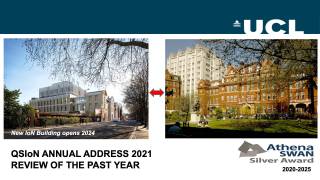
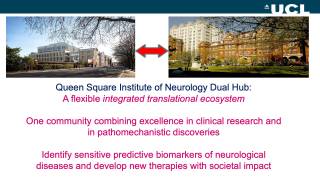
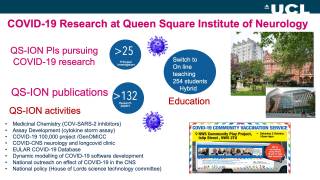
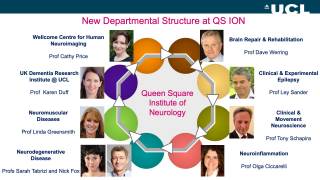
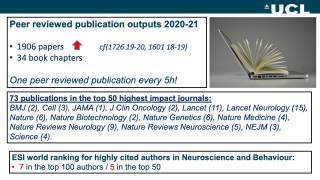

The ION recently held a PI Science Away day which highlighted all departments' engagement in bidirectional translational research. Professor Hanna highlighted the translational work at Leonard Wolfson Experimental Neurology Centre, including antisense therapies for Huntington's Disease, and pre-clinical gene therapies for epilepsy, spasticity and MND, the construction of the dual hub for UCL translational neuroscience, which held a ground breaking ceremony in May 2021, and the appointment of the Deputy Director for Enterprise, Translation and Advanced Therapeutics.
These achievements were complemented by many individual IoN researchers' awards and appointments, including new Fellows of Academy of Medical Sciences and Royal Society, alongside success in 2021 senior and early career promotions.
Professor Hanna also highlighted ION-wide EDI initiatives, including successful renewal of Athena SWAN Silver award, mentoring scheme and award, as well as Educational achievements, including success in PRES results, new PhD fellowships and PhD supervisor award to Professor Schiavo, and the ION's sustainability initiatives, including the development of the UCL NeuroClimate Consortium.
He congratulated all our students on their recent graduation.
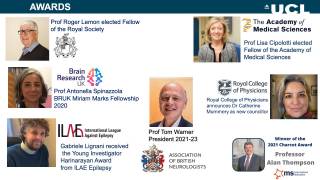

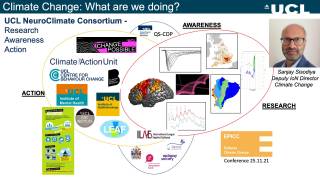
Annual Address
We were delighted to welcome as the guest speaker UCL President & Provost, Dr Michael J Spence AC on "Universities and a health system for the future". Dr Spence began by highlighting the impact of changing demographics, rising inequalities and costs of technologies and care, and the shifts in demand, placing pressures on healthcare systems. He discussed how they might face these through increased multi-disciplinary approaches and engagement with partners, and increased health systems and management research.
Dr Spence emphasised the complexities and challenges in bringing together multiple disciplines and partners, including career structures, resourcing, communication and leadership. He cited existing examples of best practice at UCL, how UCL cross-working increases the impact on public health and quality of life, and his commitment to the whole of the University being stronger together.
Vote of Thanks
The event closed with a vote of thanks by Dr Helene Crutzen, Institute Manager, who reflected on her past six years in office, particularly Professional Services and ION cultural changes during that time, as well as the contributions of the Professional Services team over the past two years.
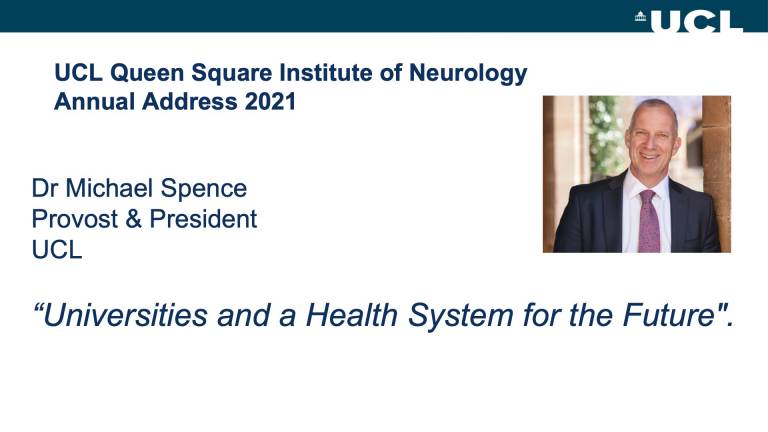
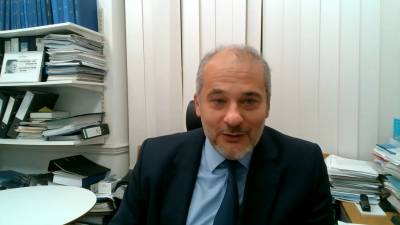
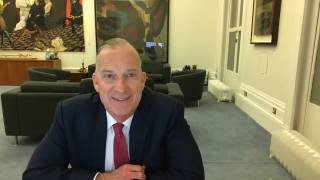

Links
- Recording of the Annual Address
 Annual Address 2021 (PDF)
Annual Address 2021 (PDF)- UCL Queen Square Institute of Neurology infographic
2020
This year's annual address on 14th December 2020, with 275 virtual attendees, began with a review of the year presented by Professor Michael Hanna, Director of UCL Queen Square Institute of Neurology, followed by Education Prizes and Annual Address given by Dr Richard J Youle.
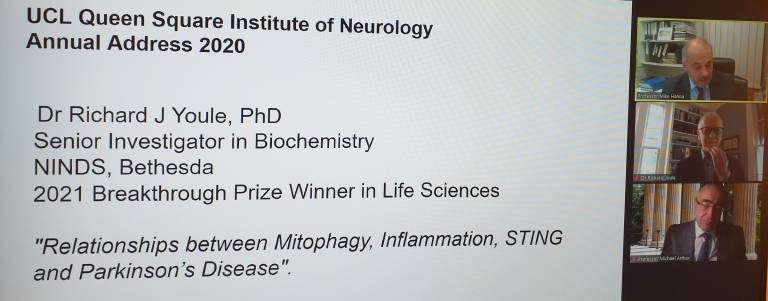
Review of the year
Professor Hanna showcased wide-ranging examples of IoN's research impact, from COVID-19 and stroke and the N-ROL collaboration with SameYou charity, to gene therapy for refractory focal epilepsy and gene discovery in SORD neuropathy, to the MS-SMART trial and anti-sense oligonucleoside trials at LWENC, DRC cohort studies and public engagement and the HD-YAS study. He also highlighted IoN's impressive research output: one paper every 5 hours on average, including over 60 publications on COVID-19, with 11 out of the 45 of UCL's Highly Cited Researchers being at IoN.
Highlights from the year included the renewal of the Wellcome Centre for Human Neuroimaging and ARUK DDI funding, and of the International Max Planck Research School; major grants, including £19m Aligning Science Across Parkinson’s (ASAP) funding, £10m for International Brain Lab; £12.5m investment in ION enterprise; and ION-DRI programme, including a number of new initiatives to improve laboratory support and ways of working and new IoN-DRI website.
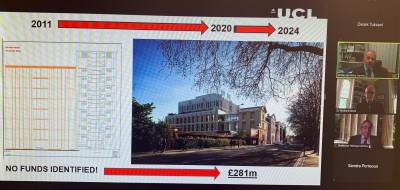
These achievements were complemented by many individual IoN researchers' awards and appointments, including new Fellows of the Royal Society and Academy of Medical Sciences, alongside 100% success in 2020 senior promotions, proleptic appointments and the appointment of a clinical academic lead for ALS.
Professor Hanna also highlighted ION-wide EDI initiatives, including the appointment of the first EDI Deputy Institute Director, Athena SWAN Silver award renewal and relaunched website, as well as Educational achievements, including Distance Learning Programme diversity, and a UCL One PS award for David Blundred. He congratulated all our students on their recent graduation.

ION Education Prizes
Professor Hanna then announced the Annual Education prizes 2020.
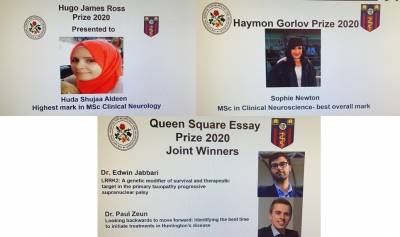
- Haymon Gorlov Prize: Sophie Newton
- Queen Square Essay Prize : Paul Zeun and Edwin Jabbari
- Hugo James Ross Prize - Huda Shujaa Aldeen
Annual Address
We were delighted to welcome as the guest speaker the 2021 Breakthrough prize winner ($3m) in Life Sciences, Dr Richard J Youle, Senior Investigator in Biochemistry NINDS, Bethesda, USA, who gave a presentation entitled "Relationships between Mitophagy, Inflammation, STING and Parkinson’s Disease"
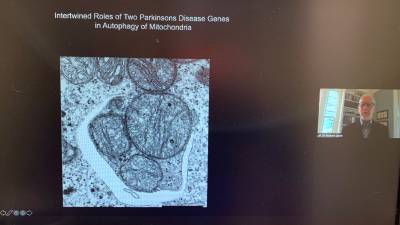
Dr Youle won this prestigious prize for his ground-breaking work on elucidating a quality control pathway that clears damaged mitochondria and protects against Parkinson’s Disease. This is a topic which is potentially relevant to many neurodegenerative diseases and therefore of great interest to the Institute of Neurology, the Faculty of Brain Sciences and the wider UCL Neuroscience community.
The event closed with a vote of thanks by UCL President and Provost Professor Michael Arthur.
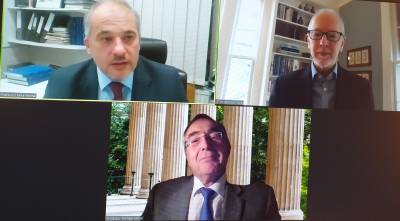
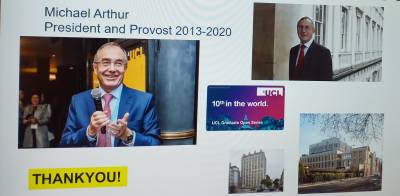
Links
- Recording of the Annual Address
- Dr Richard J. Youle's academic profile
- UCL Queen Square Institute of Neurology infographic
- ION-DRI Programme
- ION Athena SWAN website
2019
This year's annual address, held on 1st October 2019, began with a review of the year's successes presented by Professor Michael Hanna, Director of UCL Queen Square Institute of Neurology.

Professor Hanna showcased wide-ranging examples of IoN's research impact, from the launch of a new high-dose aphasia service and research into microbleeds and anti-coagulation in stroke, to gene therapy in epilepsy, MS-STAT2 trial and MRI in MS prognosis, anti-sense studies at LWENC, work with Genomics England, and the 1946 cohort study in dementia.

He also demonstrated IoN's impressive research output: one paper every 5 hours on average, and five a month in the world’s very highest impact journals.
Highlights from the year included:
Quinquennial review of ARUK DDI, the new 7T scanner in 12 Queen Square, 50th anniversary of Reta Lila Weston Institute, Sigrid Rausing Trust funding, IoN departmental reorganisation, including new Movement Disorders Centre, QS Genetics Therapies Centre, and launch of the QS MND Centre and the recent planning approval of the new translational neuroscience building.
These achievements were complemented by many individual IoN researchers' awards and appointments, including an NIHR Professorship, new Fellows of the Royal Society and Academy of Medical Sciences, and the appointment of UK DRI at UCL Associate Director, alongside 100% success in 2019 senior promotions,and Teaching Awards.
Mike then announced the annual Education prizes 2019.
- Miss Helene Marie (Nina) El-Bacha, MSc Clinical Neuroscience, Haymon Gorlov Prize
- Dr Sabhat Iqbal, MSc in Clinical Neurology, receiving the Hugo James Ross Prize 2019 from Professor Michael Hanna (left hand image below)
- Dr Karen Suetterlin, MRC Clinical Training Fellow, receiving the Queen Square Essay Prize 2019 from Professor Michael Hanna (right hand image below)


We were delighted that Dr C Frank Bennett delivered this year's annual address on antisense oligonucleotide-based therapy (ASO) in neurological diseases. Dr C Frank Bennett is Senior Vice President, Research & Neurology Franchise Leader, IONIS Pharmaceuticals Inc and is co-recipient of the 2019 Breakthrough Prize for Life Sciences and recipient of the 2019 Leslie Gehry Brenner Prize for Innovation in Science.

Dr Bennett began his address with an overview of the history of neurogenetic discovery in the 1990s, and the subsequent development of new drug discovery platforms. He covered the advantages of ASO, including direct translation of genomic information into drug development, and the efficiency of the drug discovery process. Seven of these have been approved for rare diseases, with around 40 in the pipeline. IONIS have been working on neurological diseases for the past 15 years, and he showcased examples of SMA, ALS, HD and Angelman Syndrome.


He concluded with a summary of the challenges of ASO, including the potential for covering a broader range of diseases, and more patient friendly drug delivery, finishing with acknowledgements and thanks to partners, including UCL Huntington's Disease Centre.
The event closed with a vote of thanks by Professor David Lomas, Vice Provost Health, UCL
Main image: Professor Lomas, Dr Bennett, Professor Hanna
Further information:
2018
This year's annual address, held on 29th October 2018, began with a review of the year's successes presented by Professor Michael Hanna, Director of UCL Queen Square Institute of Neurology.
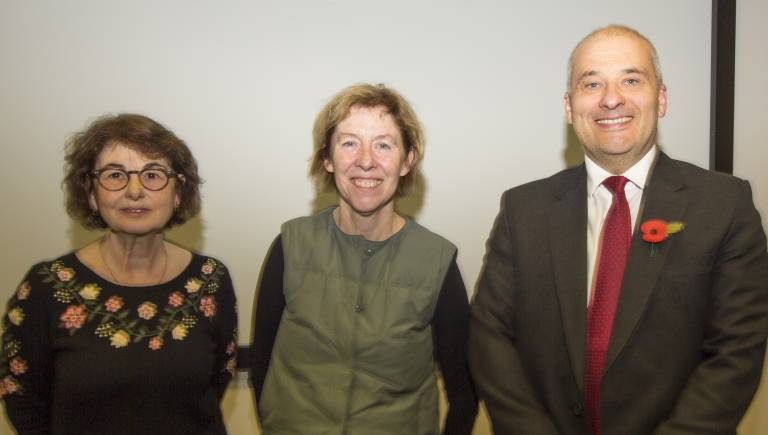
Professor Hanna showcased wide-ranging examples of IoN's research impact, from wearable Magnetoencephalography (MEG) to statins and MS, and gene therapy for refractive epilepsy to HD protein lowering drugs. He also demonstrated IoN's impressive research output: one paper every 8 hours on average, and three a month in the world’s very highest impact journals.
Highlights from the year included a record turnover of over £80m and £268m current active research grants, new appointments at, and formal opening of, UK DRI at UCL, renewal of Max Planck UCL Centre for Computational Psychiatry and Ageing Research, creation of Departments of Clinical and Movement Neurosciences and Neuromuscular Diseases, rebranding as UCL Queen Square Institute of Neurology, and plans for new translational neuroscience building at EDH.
These achievements were complemented by many individual IoN researchers' awards and appointments, including the Brain Prize (for the second successive year), NIHR Professorship, and new Fellows of the Royal Society and British Academy, alongside 100% success in 2018 promotions.
Mike then presented the annual Education prizes 2018.
Tayla Goble, MSc in Clinical Neuroscience, receiving the Haymon Gorlov Prize 2018 from Professor Michael Hanna
Dr Olivia Poole, Clinical Research Fellow in Neurology, receiving the Queen Square Prize 2018, from Professor Michael Hanna.
We were delighted that Professor Fiona Watt FRS, Executive Chair of the MRC, delivered this year's annual address on "My Vision for UK Biomedical Research". Professor Watt is seconded from her post as Director of the Centre for Stem Cells and Regenerative Medicine at King’s College London, and is internationally recognised in her field, with expertise in the stem cells of healthy and diseased skin.
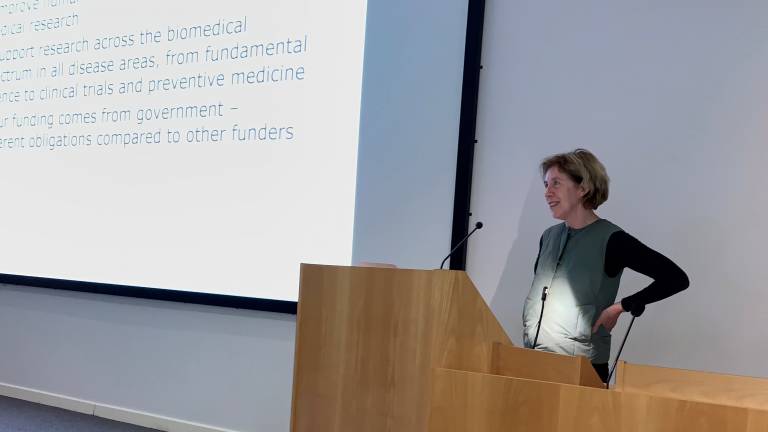
Professor Watt talked about her role in helping to shape the UK biomedical research landscape at this time of extraordinary transition, and her aspiration that the UK should provide the best medical research environment in the world, with superb facilities and creative funding to support excellence throughout the country.
The event closed with a vote of thanks by Professor Gill Bates (Professor of Molecular Neuroscience, Neurodegenerative Diseases, UCL Queen Square Institute of Neurology)
Further information
Main image: Professor Watt, Professor Bates, Professor Hanna
2017
This year's annual address, held on 7th November 2017, began with a review of the year's successes presented by Professor Michael Hanna, Director of UCL Institute of Neurology.
Professor Hanna showcased wide-ranging examples of IoN's research impact, from gene discovery and gene-silencing, to seizure imaging and re-purposing of drugs in Parkinson's Disease. He also demonstrated IoN's impressive research output: one paper every 6 hours on average, and one a week in the world’s very highest impact journals.
Highlights from the year included record research grant income at over £70m, and £248m current active research grants (2016/17), the selection of UCL as the hub of research activities and operational headquarters of the UK Dementia Research Institute, the opening of the Huntington's Disease Centre, and renewal and rebranding of the Wellcome Trust Centre for Neuromaging. Enterprise highlights included Gold Standard Phantoms (IoN’s first start up) achieving £1m additional equity.
These achievements were complemented by many individual IoN researchers' awards and appointments, including the Brain Prize, Weston Brain Institute International Outstanding Achievement Award, Citation Laureates, the first female ABN president, and new Fellows of the Royal Society and Academy of Medical Sciences, alongside 100% success in 2017 promotions.
Mike then presented the annual Education prizes 2017:
|
| |
Queen Square Prize Michael Thor | Hugo James Ross Prize (MSc Clinical Neurology) Stephanie Azzopardi | Haymon Gorlov Prize (MSc Clinical Neuroscience) Christopher Hatton |
We were delighted that Professor Bart De Strooper, Professor at the Institute of Neurology and Director of the UK DRI delivered this year's annual address. Professor De Strooper's major science contributions include discovering the role of presenilins in AD, the role of kinases PINK-1 and LRRK2 in PD, miRNAs in AD, and characterising the cellular phase of AD. The latter formed the basis of his Annual Address.
Professor De Strooper's presentation emphasised the global nature of the disease, and the knowledge gap in research. He focused on 21st century methods, including single cell biology and humanised models, and future priorities in addressing the disease, drawing parallels with cardiovascular health, in terms of risk factors, early diagnosis, lifestyle and stabilisation therapy.
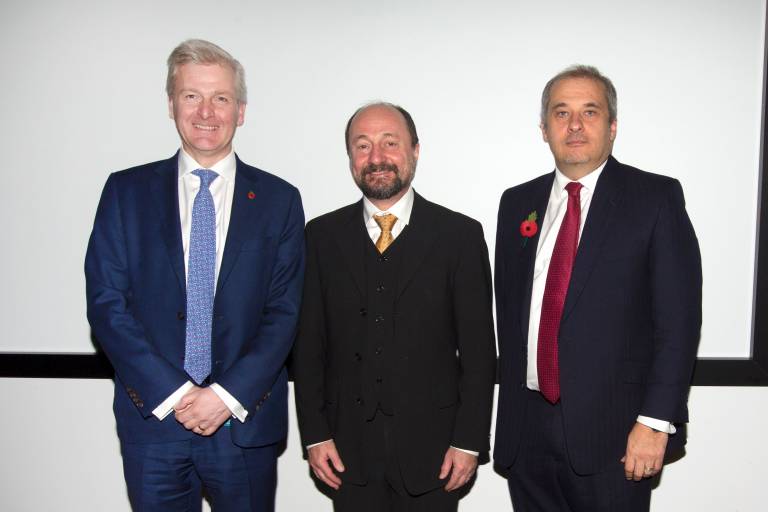
Professor Lomas, Professor De Strooper, Professor Hanna
The event closed with a vote of thanks by Professor David Lomas (UCL Vice Provost (Health) who concluded by congratulating all at the Institute of Neurology for the past year’s successes and looking forward to UCL's world-leading future in Neuroscience.
Further information
 Close
Close


